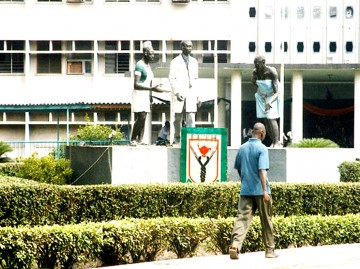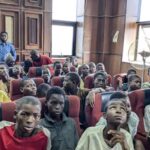A new report by the Socio-Economic Rights and Accountability Project (SERAP) has revealed the “humanitarian crisis, manifestations of corruption and mismanagement at the Lagos University Teaching Hospital, (LUTH) Idi Araba and how unhygienic conditions, severe shortages of medicines and medical supplies in the hospital and two other Federal Government owned hospitals in Lagos make it extremely difficult for many Nigerians to obtain essential medical care.”
Apart from LUTH, the other two hospitals covered in the report “are the National Orthopaedic Hospital, Igbobi (NOHIL), and the Federal Medical Centre, Ebute Meta (FMC).”
The report shows “a sharp deterioration in the quality and safety of care in these hospitals. LUTH, NOHIL and FMC do not have enough cancer treatment machines. Linear accelerator (LINAC), magnetic resonance imaging (MRI) and CT scan machines are not working optimally due to erratic electricity even as the hospitals do not have back-up plans.”
According to the report, “A LINAC costs about US$5 million and the six that the Federal Government procured for six teaching hospitals have packed up. The dialysis machine at LUTH is outdated and its functionality at the time of study was zilch. LUTH recently lost its accreditation to teach dentistry because all its five dental chairs had packed up and there is no functional dental engine available.”
The 53 page-report launched on Tuesday at the CITI-HEIGHT Hotels, Lagos titled “Failing Healthcare: How Federal Hospitals are letting Down the Poor and Making Healthcare a Privilege rather than a Right.” and presented to the media by Professor Dejo Olowu, Dean, School of Law, American University of Nigeria disclosed that “vital medical supplies such as oxygen, diagnostic machines, dental chairs, sterilising units, burns apparatuses, were in pronounced shortage. Overcrowded waiting rooms and wards were noticeable.”
The report was part of the highlights of the public hearing held by SERAP to provide forum for people to provide testimonies and submit complaints/petitions on allegations of corruption they encounter while accessing public services particularly in the health, education and water sectors.
The research for the report was conducted between April and June 2018 using semi-structured in-depth interviews as the primary instrument for data collection.
The public hearing was attended by among others the representatives of the Acting Chairman of the Independent Corrupt Practices And Other Related Offences Commission (ICPC), Economic and Financial Crimes Commission (EFCC), the Special Adviser to President Muhammadu Buhari on corruption, civil society, lawyers, the media, Freedom of Information Unit of the Federal Ministry of Justice, Nigeria Union of Petroleum and Natural Gas Workers (NUPENG) and the public in general.
The report read in part “Our researchers observed that some wards have no mosquito nets. And there is no waiting area for mothers with sick babies There is the Gynaecology ward, at which entrance a small bench that could seat about four persons, was placed. The bench was occupied by patients’ relatives, presumably. At the end of the corridor where the neonatal ward is, there is a similar four-seater bench, fully occupied. The bench, having been occupied, a group of people were standing. At the neonatal ward, it was the same case. A waiting room for mothers whose babies are on admission was not part of the hospital’s plan. The mothers have improvised.”
“A woman lay on the bare pavement under the staircase, taking a rest. Nearby was an area where waiting mothers had carved out as waiting area. A number of women, whose babies were on admission, were seen sitting or lying down on a mat or on the pavement. With the laid mats, sacks of clothes, plates, buckets etc stacked against the wall and a woman washing clothes, it was clear that many a mother stay for days in this state.”

 Join Daily Trust WhatsApp Community For Quick Access To News and Happenings Around You.
Join Daily Trust WhatsApp Community For Quick Access To News and Happenings Around You.

